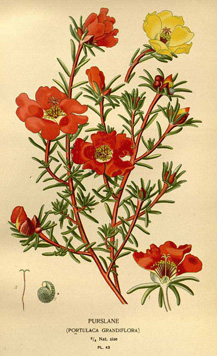Phosphorescent Portulaca
By Audrey Stallsmith

Scentless portulacas crowded down the borders,
White and scarlet-petaled, satin-rose and gold. . .
"The Garden" by Margaret Widdemer
In midsummer this year, I purchased some discounted leggy portulacas (Portulaca grandiflora) from our local Wal-Mart and cut them back drastically before planting them at the front of my driest garden bed. Amiably unoffended by this rude lopping, they shortly began to bloom again and have continued to do so quite happily into autumn.
Called moss roses, flowering mosses, or great-flowered purslanes, portulacas boast single or double flowers so satiny and vividly colored that they almost seem to glow from within. To me, moss rose blooms look more like cactus flowers than roses, and portulaca is, indeed, a succulent plant.
Its foliage imitates evergreen needles, but plump and soft needles which are harmless to the touch. Its name combines the Latin porto (“to carry”) and lac (“milk’) in reference to the milky juiciness of that foliage.
The blooms on traditional portulacas remain open only in the morning on sunny days and decline to bloom under cloudy conditions—explaining why they also have been called sun plants and eleven o’clocks. However, many modern hybrids have been bred to perform into the afternoon as well. They are related to the broader-leaved garden weed called purslane (Portulaca oleracea), which we often eat as a green vegetable.
There also are broad-leaved ornamental portulacas available with single flowers. Although they sometimes are sold under the same species name as the weed, The New Sunset Western Garden Book reports that they really are "a strain of Portulaca umbraticola."
Scottish botanist Dr. John Gillies ran across moss roses in Argentina in the early 1800s and must have been struck by the brilliance of their colors. Although we regret the fact that portulaca refuses to brighten dark days, it otherwise is an easy-going, easy-to-please plant which flourishes in poor soil and requires little care—beyond the occasional haircut!
Portulaca grandiflora image is from Favorite Flowers of Garden and Greenhouse by Edward Step, courtesy of plantillustrations.org.








